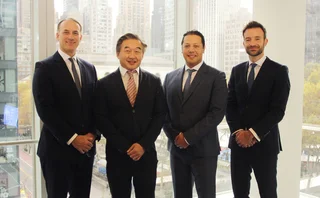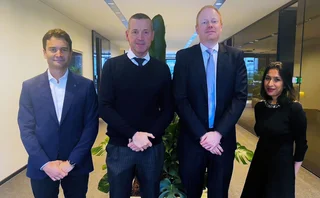
Outstanding contribution to the European FoHF industry: Lionel Paquin, CEO, Lyxor Asset Management
Continual innovation is how FoHFs will be able to meet the challenges of the future

European Fund of Hedge Funds Awards 2016
Funds of hedge funds (FoHFs) are facing what might be their biggest challenge. A combination of technological advancements and changing investor preferences and demands are forcing FoHFs to evolve in ways no one imagined before the financial crisis.
"[FoHFs] have been in the crossfire, with heavy criticism since the 2008 financial crisis," says Lyxor CEO Lionel Paquin. "The industry has been criticised over insufficient performance and high fees. Now we are facing unprecedented – probably historical – market, political and social challenges."
These are tough but interesting times for FoHFs and the entire alternatives sector, he says. But with challenges come opportunities. Paquin believes the "extraordinary combination of market conditions" is paving the way for major changes in the FoHF industry and at Lyxor.
"We're in a phase where those with the most skills will survive. FoHFs need to differentiate and to innovate," he says.
Two trends are prevalent at the moment. One is the demand from investors for access to early-stage single hedge fund managers with real skill. As the big-name hedge funds face capacity constraints, investors are looking for more niche and start-up managers.
"Investors are definitely looking for innovation, for example, early-stage and niche managers. This makes manager selection skill absolutely key. The ability to detect talent – to see the hidden talent – is needed to build fund of funds allocations, Paquin says.
The other major trend driving the FoHF industry is regulation and the rise of liquid structures. "We thought AIFMD [the Alternative Investment Fund Managers Directive] was going to be the switch point for hedge funds. But AIFMD has proved more complex than expected for everyone in the industry, whereas Ucits is now leading the way, attracting many skilled people who are able to put interesting strategies in a Ucits format."
People with creativity and unique skills will survive, notes Paquin, and these people are likely to use liquid, regulated structures for their strategies.
Paquin believes Lyxor is well placed to take advantage of these two trends. The management company has always predicated its business model of the alternative investment side on hedge fund selection, putting significant resources into creating and maintaining an investable universe of managers. Lyxor analysts track existing and new managers, continuously looking for those able to create consistent returns for investors.
Alternative investment makes sense. Institutional investors we talk to are looking for ideas. Where is yield? Where is performance? Where is sustainability of performance? They all dream of these factors and alternatives is the place they will find this
Lionel Paquin
Lyxor, while late in recognising the attractions of Ucits fund structures, has seen its Ucits platform produce significant growth of more than 30%, going from zero to $2.5 billion in assets under management in just two years. Paquin attributes this success to Lyxor's ability to select good managers and its engineering capabilities in the Ucits area. "We've made huge efforts in our push into the liquid Ucits structure," he says.
FoHFs are not dead. However, those with questionable cost/performance ratios and multiple layers of fees offering poor liquidity are pursuing an outdated model, according to Paquin.
Allocation to carefully selected hedge funds still "makes perfect sense", he says, especially as the challenges facing investors, with idiosyncratic risks everywhere – Brexit, uncertainty over US and European elections, and volatile markets – makes it absolutely critical to have the right allocations and decorrelation through strategies, hedges and overlays.
"Alternative investment makes sense. Institutional investors we talk to are looking for ideas. Where is yield? Where is performance? Where is sustainability of performance? They all dream of these factors and alternatives is the place they will find this, if allocations are made on the basis of astute manager selection predicated on liquidity and structure," explains Paquin.
Investors are looking for cost-efficient, transparent structures. "These are not easy to build. There is a lot of engineering needed as well as tough negotiations with managers on fees. The results are multi-manager structures that are an enhancement and evolution of the traditional FoHF model. We've experienced appetite for such structures from investors. For example, we are raising assets at a spectacular pace for our Evolution fund and similar mandates," Paquin says.
Evolution is a multi-manager product in a Ucits structure, allocating through managed accounts to five underlying fixed-income specialist fund managers. Not only is the structure innovative, but the flat fee structure makes it even more cost-efficient than a single manager Ucits vehicle.
Paquin believes manager selection, creative solutions, lower fees and the ability to manage multiple allocations give FoHF managers an opportunity to evolve into a business more suited for today's investors.
One sector, attractive to investors but difficult to access, is early-stage managers. While Lyxor is not in the seeding business, its team of almost 30 analysts – split between hedge and mutual funds – has a good track record in spotting rising talent. "We've been putting money into early-stage managers and niche strategies through the managed account platform for years. Using the platform ensures larger investors are comfortable putting money into such managers. The platform helps mitigate operational risk and ensures liquidity and transparency," says Paquin.
Customising solutions
Lyxor is also moving into designing and executing more customised solutions. "We want an investable universe that is a smart mix, combining established and early-stage mangers. If we have enough appetite and interest in new strategies, we can put them onto our managed account platform," he notes.
Lyxor also recognises the move into more illiquid strategies by investors. It can accommodate not just daily or weekly liquidity on its platform but monthly or quarterly if the strategy makes this sensible. Such accounts cannot be in a Ucits format, however, as liquidity there is limited to a maximum of two weeks.
For strategies unable to fit into Ucits, Pacing believes AIFMD is the answer. "I prefer hedge funds and FoHFs to have the most appropriate regulatory framework. AIFMD is great. This directive turns non-regulated businesses into regulated ones, giving more reassurance to some investors. It's appropriate for hedge fund managers who needed more freedom to trade different asset classes and specific instruments as well as use leverage. AIFMD enables managers to do this," he explains.
Looking to the future, Paquin says Lyxor remains ambitious. He wants to see the company expanding not just in Europe but also in the US and Asia. One area of business he expects to become significant in future is investment management on behalf of large institutional investors.
For the past four years Lyxor has been managing the alternative investment money of a prominent large US pension fund. "We are in the process of expanding this mandate and we're talking to a number of other pension funds about similar mandates."
Many pension funds in the US use hedge funds for equity downside risk protection for their whole investment portfolio. "Large institutional investors want to use hedge funds for a very precise and well thought-out purpose, which is creating protection in their balance sheet, not as performance engines. They want decorrelation features compared to traditional asset classes, especially equity and fixed income. Hedge fund allocations are interesting in this role and are relevant," he says.
A new area for Lyxor is the transfer of its expertise and experience in monitoring hedge funds and managed accounts into a fiduciary manager of retirement schemes. Lyxor has already been successful in winning the mandate to be the fiduciary manager for the retirement scheme of Engie, a French multinational electric utility company.
We could be the fiduciary manager of entire retirement schemes in future. This is interesting for us
Lionel Paquin
"We could be the fiduciary manager of entire retirement schemes in future. This is interesting for us," he says, pointing to the fact that Lyxor was given fiduciary management of the entire investment portfolio, not just the alternatives part. "We've expanded our hedge fund selection and structuring capacities to mutual funds as well," says Paquin.
As the boundaries between the long-only world and hedge funds continues to blur, Paquin believes Lyxor is uniquely placed to take over similar fiduciary management roles in future.
"What we do on hedge fund selection, negotiations, transparency and reporting at a global level can be leveraged to apply to full portfolio monitoring, using our infrastructure, governance and technology from the hedge fund side."
This means Lyxor will be – and in some cases, already is – facing new competitors who are not present at all in the alternatives universe. He believes this crossover of alternative skills into the long-only world will accelerate and he hopes Lyxor will be able to win more fiduciary management mandates in Europe over the coming years.
Over the medium term, Paquin wants to make Lyxor into the undisputed leader in fiduciary investment platforms. "I'm confident we can do this with large institutions in Europe. In future, I expect Lyxor to be less perceived as an alternative specialist investment house and more as a strategic fiduciary allocator. I would really love to see Lyxor become a huge success in this business," says Paquin.
However, he is not ready to let go of the alternatives business. He would like to see the Ucits business continue to grow, with AIFMD structures eventually taking on a similar growth trajectory.
"Alternative investment is not a niche part of Lyxor. It's one side of the investment continuum going from beta to smart beta, risk premia, multi-asset, alternative risk premia and at the end of that spectrum, hedge funds. Our business model already covers much of this investment continuum," he points out.
"I expect hedge funds to remain a significant part of Lyxor's expertise and our assets under management but we want to grow faster than the alternative investment industry. We want to be part of institutional multi‑management."
In short, Paquin wants Lyxor to meet the technological challenges, continuing to innovate in all areas of its business and creating unexpected solutions for investors. "Continuing to surprise people: that's what I want to do," he says.
Only users who have a paid subscription or are part of a corporate subscription are able to print or copy content.
To access these options, along with all other subscription benefits, please contact info@risk.net or view our subscription options here: http://subscriptions.risk.net/subscribe
You are currently unable to print this content. Please contact info@risk.net to find out more.
You are currently unable to copy this content. Please contact info@risk.net to find out more.
Copyright Infopro Digital Limited. All rights reserved.
As outlined in our terms and conditions, https://www.infopro-digital.com/terms-and-conditions/subscriptions/ (point 2.4), printing is limited to a single copy.
If you would like to purchase additional rights please email info@risk.net
Copyright Infopro Digital Limited. All rights reserved.
You may share this content using our article tools. As outlined in our terms and conditions, https://www.infopro-digital.com/terms-and-conditions/subscriptions/ (clause 2.4), an Authorised User may only make one copy of the materials for their own personal use. You must also comply with the restrictions in clause 2.5.
If you would like to purchase additional rights please email info@risk.net
More on Awards
Clearing house of the year: LCH
Risk Awards 2025: LCH outshines rivals in its commitment to innovation and co-operation with clearing members
Best use of machine learning/AI: CompatibL
CompatibL won Best use of machine learning/AI at the 2025 Risk Markets Technology Awards for its use of LLMs for automated trade entry, redefining speed and reliability in what-if analytics
Markets Technology Awards 2025 winners’ review
Vendors jockeying for position in this year’s MTAs, as banks and regulators take aim at counterparty blind spots
Equity derivatives house of the year: Bank of America
Risk Awards 2025: Bank gains plaudits – and profits – with enhanced product range, including new variants of short-vol structures and equity dispersion
Law firm of the year: Linklaters
Risk Awards 2025: Law firm’s work helped buttress markets for credit derivatives, clearing and digital assets
Derivatives house of the year: UBS
Risk Awards 2025: Mega-merger expected to add $1 billion to markets revenues, via 30 integration projects
Interest rate derivatives house of the year: JP Morgan
Risk Awards 2025: Steepener hedges and Spire novations helped clients navigate shifting rates regime
Currency derivatives house of the year: UBS
Risk Awards 2025: Access to wealth management client base helped Swiss bank to recycle volatility and provide accurate pricing for a range of FX structures







